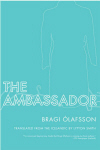The Ambassador
Bragi Ólafsson is a well-known author of poetry, short stories and novels in Iceland. His fifth novel The Ambassador was the finalist for the 2008 Nordic Literature Prize and received the Icelandic Bookseller’s Award as best novel of the year.
Bragi Ólafsson is a well-known author of poetry, short stories and novels in Iceland. His fifth novel The Ambassador was the finalist for the 2008 Nordic Literature Prize and received the Icelandic Bookseller’s Award as best novel of the year.
The Ambassador is a well-structured novel, contemporary in its hero Sturla Jon Jonsson, an apartment super in his fifties, but also here a wandering poet. Sturla’s adventures and misadventures sometimes seem aimless in the sense of a quote from an early collection of his poems, “free from freedom.” On the other hand, this novel, almost like a prose poem, has a definite framework and structure, while suggesting what “free from freedom” means.
First we meet Sturla buying an English Aquascutum overcoat, which he has saved up for, and immediately Gogol’s The Overcoat comes to mind. Afterwards, Sturla wanders Reykjavik’s streets, passing buildings that are gone or replaced by others, notably the bank where he once worked and a bookstore, which is now a gambling place, which Sturla wanders into and wins big. He also mentions a poem about a mother behind a barred window, a reference to his alcoholic mother, a set of lines which his critical father says are untypical of Sturla’s poetry, and even Sturla calls himself the “purported author” of his just published assertions collection.
Thus emerges the novel framework: the mother and the overcoat, showing up again at the very end of the book. Also his wanderings offer the theme of displacement, which really gets developed in Vilnius where Sturla goes for a poetry festival. Throughout the book, he is imagining where people are at that moment, what they might say to him, not just memories from his past but familiar places which are not the places where he is. Towards the end of the book he seems lost in Vilnius since his mind is really in Reykjavik. Like the replaced buildings, he replaced an older Icelandic poet, which is a really funny segment. He even imagines himself as his long dead poet cousin Jonas, a connection that gets Sturla into trouble while he’s in Lithuania.
The title seems ironic. He is sent by his government (all expenses paid) as the nation’s ambassador at Lithuania’s Nordic Season of Poetry festival. However, he becomes anything but an ambassador. His grandfather was the only real ambassador in the family, Iceland’s ambassador to Norway. Even the prediction by a teacher that Jonas, from his brilliance, would become an ambassador is doomed by Jonas’ suicide.
There is a certain definiteness to Sturla’s actions in the beginning: planning ahead for the expensive new overcoat and the determination to give up poetry in favor of writing articles about the festival, and maybe a novel. And before he leaves Iceland, he does write an article about the festival, a satiric piece based on previous festivals, one of the funniest sections of the novel. But then in Lithuania, governed by “omens” – a hazelnut (lucky?) and a dwarf at the hotel reception (unlucky), plus the greeter being named Jonas – Sturla’s wanderings become misadventures, following people and eventually getting into trouble. Not only is the overcoat stolen, but he does the same – stealing a Brooks Brothers coat. Meanwhile at home, assertions’s authorship is being challenged, a scandal making the newspapers’ front pages.
Events, like Sturla’s wanderings, are explained later. For instance, early in the novel he mentions a childhood memory, something written on a mirror during a parental fight, something to do with “mother.” At the end we get the full quote as the novel comes full circle, to where he is about to break the cycle: “The mother of my children has / murdered the child in their father.” By then, he has come to grips with his running away, and also with his insignificance as a poet, like his poem’s lines which a fellow poet translated, “I knew the substance / I was made from / was not meant to last / it wouldn’t survive / a lifetime.” This fellow poet, whose work he reciprocally translated, is the woman he loves at the end. Will he go with her to Belarus or return home? Sturla notes about the novel “that thrillers don’t need a robbery or a murder to hold your attention. They just need to create some uncertainty about whether or not the protagonist will make his Big Decision.” So has he created himself in a novel?
The amusing, insightful, very accessible and realistic novel not only talks about poetry but offers up a quirky contemporary human lost in his wanderings to find himself. Its structure is admirable, but like a thriller, it is also a page-turner.





